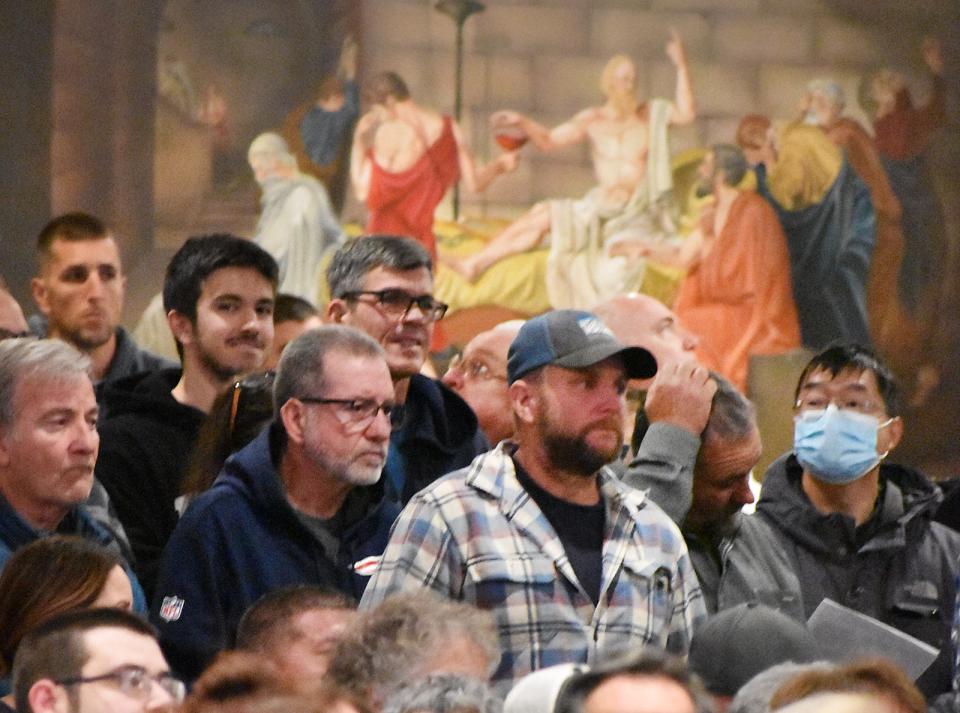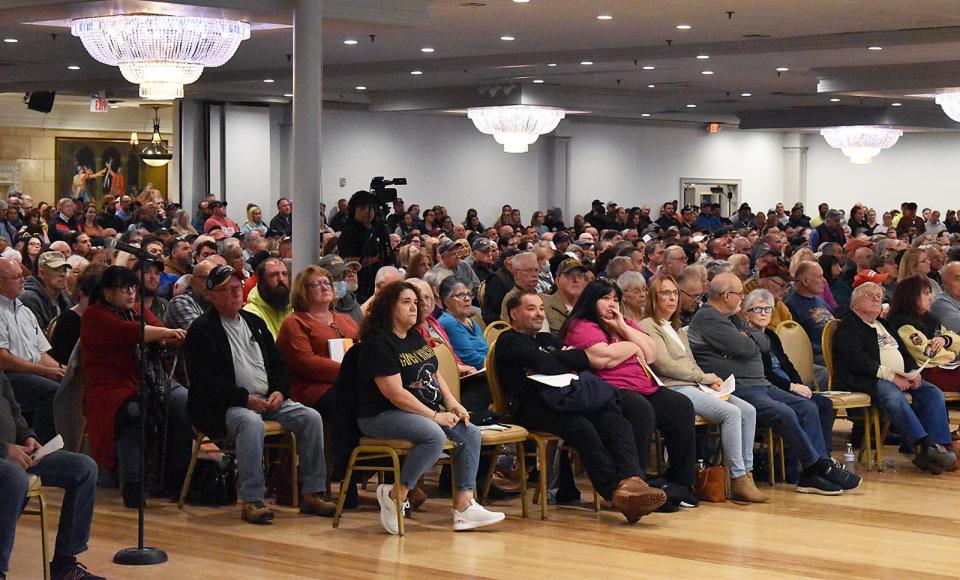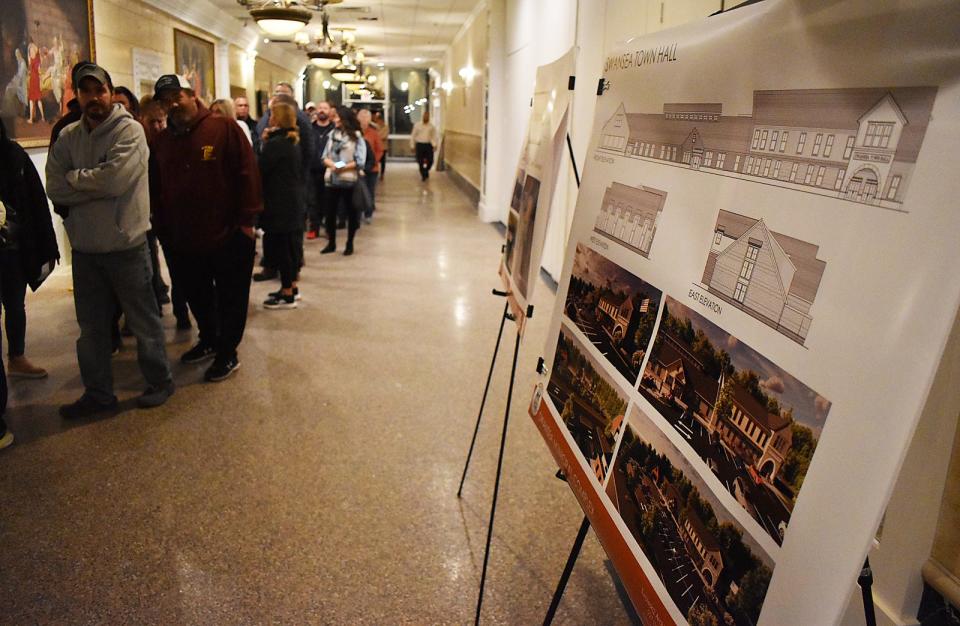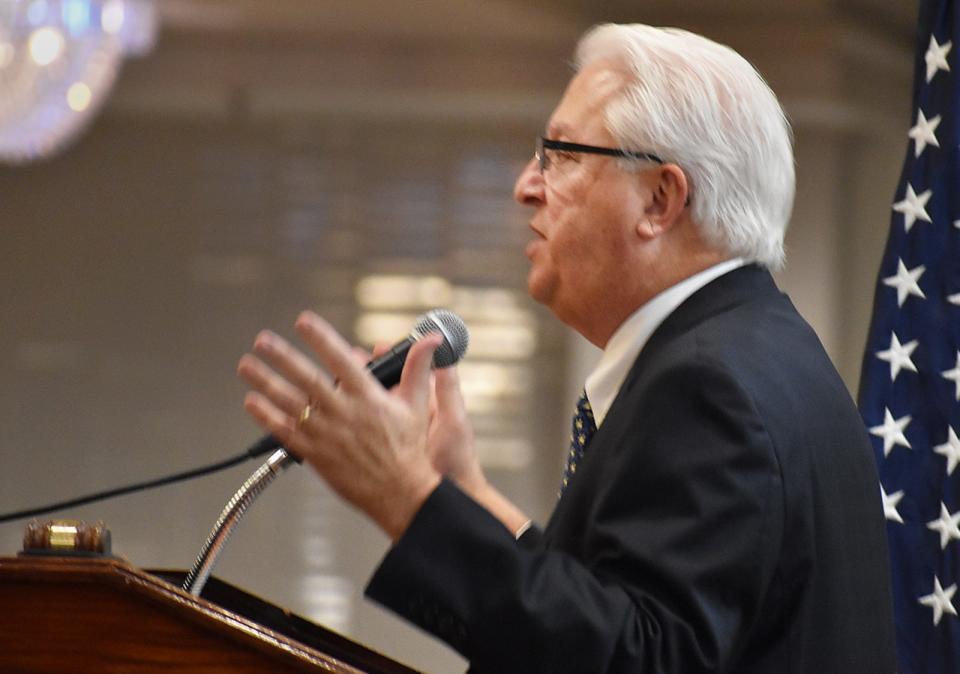Swansea's Municipal Complex plans crushed at Special Town Meeting. Here's what happened
SWANSEA — The voters' message was loud and clear. Wrong time. Wrong price tag.
The $53 million Municipal Complex Project – endorsed by the Board of Selectmen, the School Committee, and the Advisory and Finance Committee – was emphatically rejected by voters at Special Town Meeting on Monday night at the Venus de Milo.
The "no" votes numbered 1,123. The "yes" votes numbered 228.
To pass, the article required a two-thirds (902) "yes" vote. Instead, the not-in-favor accounted for 83% of the 1,351 votes cast at the end of the long meeting, which stretched from 7 to 11 p.m.

An hour-and-a-half of that was dead time. Formally opened at its scheduled 7 p.m. start time, the meeting recessed for about 90 minutes to allow all the citizens to get into the function room and check in.
The total number of citizens to register was 1,437. Some of the voters in attendance, seemingly from the not-in-favor side of the Municipal Complex debate, repeatedly drew the ire of moderator Paul Burke with their yelling, jeering, cheering and booing.

Why were residents opposed to the Municipal Complex?
About two dozen people – mostly citizens, but also town officials and professionals associated with the proposed Municipal Complex – spoke during the Article 5 question and debate time. While citizens criticized the project's placement and traffic concerns, the No. 1 complaint was the price tag and how it would affect taxes. According to the town, the cost to a resident with a $400,000 home would have been an additional $450-$500 on their annual property tax bill.

“I think there are a lot of factors contributing to tonight's failing (to approve),” said Board of Selectmen member Steven H. Kitchin. “The project was ambitious. It's a large sum of money. There was certainly concern by the citizens here tonight about the economy and what the economy was doing to them in terms of their ability to purchase, as we heard, the staple items: food, energy, etc.
“Add that to a challenging climate for building development in any sort for municipalities, and you had a combination of factors weighted against it.”

What is the Swansea Municipal Complex plan?
The two-building (three if you count a road salt shed) project would have brought government offices, the Council on Aging, and the Highway Department together at the old Del Mac Orchard Property. The pro-project slide presentation said that the current town facilities – Town Hall, Town Hall Annex, and the COA building – all in multiple ways fail to comply with OSHA, ADA, and building standards. Town Hall is more than a century old.
Kitchin, acknowledging the unpleasant reality of a tax hike if the project was approved, asked voters, “What does passing the buck to future generations do? I'm asking you to sacrifice a dollar a day.”
What's wrong with Swansea's current municipal buildings?
Among the many shortcomings to be found at the three town structures, according to the presentation, are the current DPW building's inability to house town heavy equipment, leaving the equipment exposed to the weather; a crumbling foundation at the annex; very limited pace at the COA; and crumbling plaster and paint and just one usable bathroom at Town Hall.
Selectman Robert C. Medeiros said Swansea has had the “good-enough mentality too long. We need to face this head on. The need won't go away. A no vote equals a yes to bigger, more expensive problems.”
Article 5 called for the town to borrow the full amount and repay over 25 years. Mallory Aronstein, town administrator, said the declining debt associated with the project would actually help with future projects, such as a new junior high school.
Kitchin was asked where, with Article 5 so soundly rejected, does the town go from here with its building woes.
“That's a very good question,” he said. “I think my colleagues and I will have to go back to the drawing board. These needs are not going to go away. We've got repairs, or any number of things that are going to need to be done. And we'll hope we'll be able to explain to the taxpayers why we need their assistance in getting them done.”
What happened with the other Swansea Special Town Meeting articles?
Of the first four articles, all decided by voice vote, two were rejected and two were approved.
Article 1, rejected, called for the town to raise and appropriate or transfer a some of available funds not to exceed $14,395 to pay an “old bill” from Attorney Anthony Savastano for legal services rendered in May of this year. Resident Geri Mullaly said the town failed to provide her with an itemized statement, the number of hours billed for, and the billing rate per hour. She suggested voting against the article.
Aronstein said she could not provide the itemized bill because it legally falls under attorney-client privilege.
Article 2, approved, called for the town to raise $2,500 for operational expenses for the sewer commissioners. Randy Lebeau, chairman of the commissioners, said the money would pay a clerk who could post on the town website what the commissioners are doing in their roles. “How else will you know,” he said.
Article 3, rejected, called for the town to raise $20,000 for a harbor advisory plan, matching a grant from the Seaport Economic Council.
Article 4, approved, calls for the town to raise no more than $2 million for a school feasibility study to evaluate options for Joseph Case Junior High School or a combined Case Junior/Senior High School.
This article originally appeared on The Herald News: Swansea voters reject the proposed Municipal Complex project

